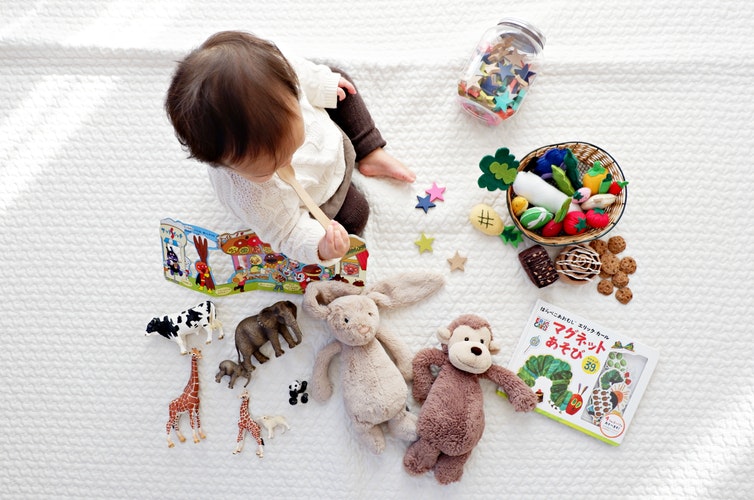
When I was struggling with postnatal depression after the birth of my first child, I found myself constantly anxious over her development. A big question that kept plaguing me was whether I was doing enough to stimulate her interest and development. I ended up seeing a maternal mental health counsellor during this time to help me cope with my anxieties and the lack of bond I felt with my child because of my depression.
An activity that we did for several sessions stayed in my mind. It was called “Watch, Wait and Wonder”. The counsellor had set up a mat in the middle of the room with several toys for my 8-month old. She encouraged me to sit back and watch my child play. I had to resist the urge to pick up a toy and introduce its name or show my child how to play it. As I watched and waited, I was filled with wonder at the creative ways my child was playing and interacting with the toys. Initially, little miss was hesitant, but without any coaxing from me or the therapist, she eventually settled with one toy and discovered ways to play with it. And just as I was starting to feel like a spare tyre, little miss crawled up to me with the toy and shoved it at me with a big smile on her face. This was my cue – her invitation for me to play with her. It was awkward at first because I had lost the art of playing. But my child did not mind my awkwardness. Instead, she was just happy to have me nearby. And over the weeks, I found myself developing a bond and appreciation for this little child, my daughter.
I am not a child psychologist or education specialist. I do not have a strong leaning towards either child-centred learning or parent-led teaching. As a parent, I am always seeking for a balance. On one hand, I believe as parents, we are given the authority to provide guidance and set healthy boundaries for our children. On the other hand, we also have a duty to be sensitive to our children’s needs and emotions, and to let them discover things at their own pace. As my children grow, I am learning to apply and adapt “watch, wait and wonder” in the different facets of life.
In this article, I would like to share my adaptation on the first concept of “Watch”.
WATCH
I like to associate “watch” with being “attentive”.
When I was 5, my parents moved the family up to Kuala Lumpur to start their own company. Being there for us children became a constant challenge with the demands of running a new business. Two years later, my parents made a creative decision of moving our home to the top floor of a 4-storey shop lot, above their office which occupied the first three floors of the building. This cut down the commute time between work and home, and allowed my mom to be there for us when we got home from school. During the day, if something important came up, we were allowed to intercom down to the office and ask to see one of our parents. With this new living arrangement, mom could help us with our schoolwork and also cook dinner for us despite working full-time, and we were able to sit down regularly for family meals in the evenings. Growing up in that environment gave us kids a sense of security that our parents were always close by if we needed them.
Obviously, not all of us run our own businesses or have jobs that are flexible. There are many other ways to be there for our children as an attentive parent, in our day and age of busyness:
1. Really listen to what matters
I’ll be the first to admit that I’m not a very good listener, especially when I am feeling tired or in the middle of doing something, and my kids are trying to tell me something. However, I do try and really listen when they share about their day, ask a question about life, or talk about an issue they are struggling with.
If I really can’t listen at that point in time (usually while driving or cooking), I tell my girls, “Wait, mommy needs to concentrate on what I am doing”, and then make an effort to come back to them when I am able to focus better. This lets them know that I do want to listen to what they are sharing, just that the timing may not be suitable.
Sometimes, with younger children especially, they may not tell you verbally that they are hurting. We were living in Thailand for six years and had sent our older girl to a local kindergarten when we first moved there. We thought she was adjusting well and had picked up the Thai language fluently. However, at the end of her second year, she showed me one of her drawings, and that was when I picked up that something wasn’t quite right. In her picture, there were five princesses. Four of the princesses were paired up and holding hands, with smiles on their faces. The fifth princess was standing alone with a sad face. I asked her who that fifth princess was. She admitted that it was her. As I probed further, I found out that the girls in her class had been quite mean to her, saying things like “you are not pretty” and “we don’t want to be your friend”. It broke my heart as a mother to know that my girl had been bullied this way during the school year without my realisation, but I was glad that I was being attentive to how she felt when she finally expressed her feelings through drawing. As a result, I was able to intervene and monitor the situation better the following year.
2. Make time for each child
We have two daughters, and we make it a point to take them out for one-on-one dates. Sometimes it’s a father-daughter date. Other times, it’s mommy-daughter time. We would go watch a movie, eat at a favourite restaurant or just have ice-cream.
This is not an original idea, and we know of many other parents who do the same. Ideally, this is where we keep our phones on silent and intentionally be present and attentive to share the moment with that child. My husband and I love it as it gives us time to spend with each child as an individual. We know that our older girl especially appreciates it as she often feels that her little sister gets more attention due to her young age.
When we don’t know what to talk about, we look up ice-breaker questions or come up with silly “would you rather” questions, e.g. “Would you rather eat vanilla ice cream everyday for a year, or try a different flavour ice cream everyday for a week?” Time alone with an individual child gives us the opportunity to laugh and get to know that child for who they are. A secure and emotionally healthy childhood gives our children a firm foundation to build their lives upon. We are told that it is important to carry on this tradition into the teenage years, as that is when they will really need it the most!
3. Friends are welcome in this home
One of the things I appreciate about my parents was the way they welcomed my friends into our home when I was growing up. I was allowed to organise my own birthday parties and invite my friends over. I could invite friends over for a meal and even organise sleepovers at our house. If a friend was hurting, my parents would open the doors of our home to that person. Because my parents were aware of who my friends were, it gave us a point of connection whenever I mentioned a friend’s name to my parents.
Now that I am a parent myself, this is something that I have carried on with my own children. My children know that they are welcome to invite friends over for play dates. We organise birthday parties for each child and make it a point to know who their classmates are. I keep in touch with like-minded parents from my children’s classes, so that we can keep abreast of what is happening at school. By being attentive to who my children’s friends are, I am able to then speak wisdom and impart a positive influence in my children on their choice of friends, and how to deal with challenges in friendships when they do occur.
Parenting is not for the faint hearted. It is a marathon journey, where each day is a fresh gift to create meaningful moments with our children. Too often we hear of empty nesters lamenting about how fast the years go by, and to make the most of today with our children while they are still young. We don’t always get it right. I don’t always get it right. With two young children at home, sometimes the days seem long even though the years feel short on hindsight. Nevertheless, let us make time to really listen to what matters, to help each child in our family feel special and cherished, and create a home that our children are comfortable sharing with their friends. May we be attentive parents who really see our children for who they are, and love them with the unconditional love that they deserve.
About the Author: Jess Chan is married with two young daughters. Aside from being full-time “minister of home affairs” and “transport minister” to her little family, she also serves as the Field Administrator for World Outreach International, a Christian mission organisation that has a presence in 70 countries. Jess and her family moved back to Malaysia in 2017, after spending 10 years in New Zealand and 6 years in Thailand.
Reposted from old website 7 April 2019
